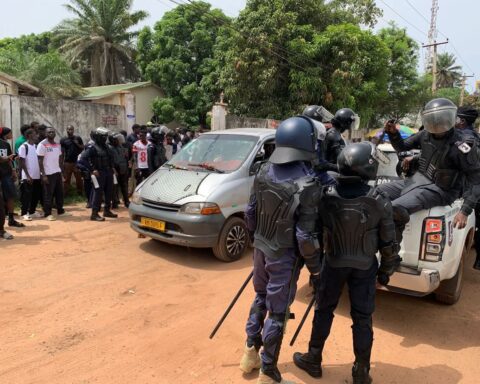By Alieu Ceesay
The Finance and Public Accounts Committee (FPAC) of The Gambia’s National Assembly tabled a damning report on Thursday, July 3, 2025, revealing significant financial irregularities at the Kanifing Municipal Council (KMC). The report, which scrutinized the Auditor General’s findings on the government’s audited accounts for the financial year ending December 31, 2020, and the financial statements of public institutions from 2019 to 2021, highlighted the absence of payment vouchers worth over GMD7.6 million at KMC, alongside other governance and accountability lapses.
The report, presented by Honourable Alagie Darboe, sparked a heated debate among National Assembly Members (NAMs), who called for decisive action to address the irregularities. After rigorous deliberations, lawmakers adopted the report, signaling a commitment to strengthening financial oversight in public institutions.
Missing Vouchers and Financial Mismanagement
The FPAC report disclosed that payment vouchers totaling GMD7,677,470.61 were unaccounted for during the audit of KMC’s financial records. “Several payment vouchers amounting to GMD7,677,470.61 have not been found within the vouchers submitted for audit review,” the report stated. This absence raises serious concerns about transparency and accountability in the Council’s financial management, as the missing vouchers could obscure the trail of public funds.
Additionally, the report flagged unrecorded revenue collections amounting to GMD60,000 by some KMC collectors. “There is a risk that the amount in question is not accounted for and may, in effect, result in the understatement of revenue,” the Committee noted, pointing to potential weaknesses in the Council’s revenue-tracking systems.
Governance and Staffing Irregularities
Beyond financial discrepancies, the FPAC report exposed significant governance issues at KMC, particularly in staffing practices. The Committee found that several key positions within the Council were occupied by individuals who did not meet the qualifications or experience requirements outlined in the Council’s Scheme of Service. “Most of them are direct entries to the positions, but neither qualification nor experience is evidenced to justify the appointment,” the report stated.
To address this, FPAC recommended that KMC’s management, in collaboration with the relevant Committee of the General Council, conduct a thorough review of the affected positions to regularize these incompatibilities. The Committee emphasized the need for competent and qualified personnel to ensure effective service delivery and adherence to governance standards.
Allegations of Fraud and Misconduct
The report also highlighted unresolved allegations of fraud at KMC, noting that an investigative report on these claims was not presented to FPAC for review. The allegations include: a loan of GMD12,000,000 secured for the purchase of a parcel of land for KMC’s senior management, alleged forgery of a letter titled “Guarantee Purchase of Land Advance Agreement,” purportedly issued by the Council, and solicitation and receipt of a GMD30,000 bribe.
The failure to provide an investigative report on these allegations further fueled concerns about transparency and accountability within KMC’s operations. FPAC urged the Council to address these issues promptly to restore public trust.
Public Hearings and Stakeholder Engagement
The findings are based on public hearings conducted by FPAC between October 2023 and February 2024. These hearings brought together key stakeholders, including Permanent Secretaries of government ministries, officials from the Accountant General’s Department (AGD), the National Audit Office (NAO), and representatives from public institutions and agencies. Mayors, chairpersons, and management of local government councils, including KMC, also appeared before the Committee to account for their activities and financial statements.
The engagements were part of FPAC’s constitutional mandate under Sections 102 and 109 of the 1997 Constitution of The Gambia, which task the Committee with examining the public accounts audited by the Auditor General. Additional powers under Section 109(3)(a), (b), (c), and Section 110 allow FPAC to issue corrective measures, including reprimands or admonitions, against entities or officials found violating financial management regulations.
Parliamentary Debate and Adoption
The tabling of the report triggered intense discussions in the National Assembly, with NAMs expressing frustration over the recurring financial and governance lapses in public institutions. Lawmakers emphasized the need for tangible actions to address the irregularities and prevent future occurrences. Honourable Alagie Darboe, who presented the report, underscored the importance of holding public officials accountable to safeguard public funds.
Following the debate, the National Assembly unanimously adopted the FPAC report, endorsing its recommendations for corrective measures. The adoption signals a renewed commitment to strengthening financial oversight and ensuring compliance with accountability standards across government institutions.
Implications and Next Steps
The revelations in the FPAC report have significant implications for KMC and the broader public sector in The Gambia. The missing vouchers, unqualified appointments, and unresolved allegations of fraud highlight systemic challenges that undermine public trust and effective service delivery. FPAC’s recommendations could pave the way for improved governance and financial management at KMC.
The Committee’s call for a review of staffing practices and the regularization of incompatible appointments is seen as a crucial step toward ensuring that qualified personnel manage public resources effectively. Similarly, addressing the unaccounted revenue and missing vouchers will require robust systems to enhance transparency and accountability.
The public now awaits the implementation of FPAC’s recommendations, particularly at KMC, where the spotlight remains on addressing the financial and governance lapses uncovered in the report. The coming months will be crucial in determining whether these findings translate into meaningful reforms or remain another chapter in the ongoing struggle for accountability in The Gambia’s public sector.
The post Parliament Adopts FPAC Report Exposing Over D7M in Missing Vouchers at KMC appeared first on The Alkamba Times.







